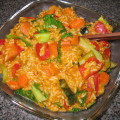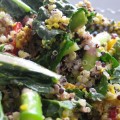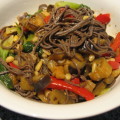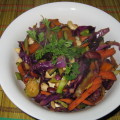When you tell people you’re pregnant, most react with joy. Two seconds later, they all invariably say “so you’ll have to at least start drinking milk then?” There’s something about pregnant vegans that scares people and usually that fear is completely unfounded. Most vegans, having made the conscious decision to stop eating meat, fish, dairy and eggs will have at least a rudimentary knowledge about where else you can get protein, calcium and all that jazz.
I’m not a nutritionist so I won’t venture into the realms of facts and figures but you will find all these and more at PCRM (Physicians Committee for Responsible Medicine, The Vegetarian Resource Group, Vegan Society and Vegfamily.
In the months leading up to my pregnancy I did a lot of reading to make sure I was confident with continuing my vegan diet through pregnancy and breastfeeding. I kept a food diary and went to a nutritionist, not so much for help, but really just to have a back-up. And it worked, my doctors had no problem with my diet once the magic phrase “my nutritionist is happy with it” was spoken!
There is an old saying that you lose a tooth for every baby, this comes from the fact that your body will sacrifice its own calcium and vitamins to feed your growing baby. This is certainly a reassurance when you are too ill to eat, but obviously your little bean would be happier if you could take in some nutrients and you’d probably be happier keeping your teeth. So here were some tricks I used when food was the last thing I wanted.
Every morning I would have cereal with vitamin & calcium-fortified soymilk, wholemeal toast, a banana and a glass of fortified juice.
With my queasy tummy at its worst at lunch time, I could only manage a bland soup. I used to drink a fruity soy smoothie with it. I carried a packet of mixed seeds (sesame, poppy & pumpkin) everywhere and dumped them into the soup. The zinc in pumpkin seeds is supposed to help with morning sickness. I always chose a wholemeal bread with grains. So straight off, my little pathetic bowl of soup for lunch was transformed into a nutritious lunch, with soymilk & fruit in the smoothie, seeds & veggies in the soup and wholegrains in the bread. With a little effort, eating well wasn’t too hard.
Throughout the day at work, I would snack on dried apricots (wonderful for iron), toast (good for queasy tummies) and nuts. Due to my mother having a peanut allergy, I abandoned peanuts, but ate at least a handful of nuts everyday, brazil nuts (just 2 a day for your RDA of selenium), almonds and walnuts (great oils). I would spread a mild homemade hummus or mushed avocado on my toast. And every evening my hubby would rustle me up a stirfry in soy sauce or chili sauce with basmati rice (I could not eat enough basmati rice!!).
So, you see there was a huge amount of good food feeding that little bean of mine, even though none of it was animal-based. As time went on the queasy feelings went, the food volumes increased and the little bean grew big and strong. It’s worth remembering that many women go through the first trimester surviving on dry crackers and water alone due to morning sickness, far from an ideal diet but you get the picture!
If you have a read of the above links, you’ll see that the biggies to watch out for are protein, calcium, vitamin D, iron, B12 and Folic Acid. Protein is easy enough to sort out (there are lots of suggestions on the links), calcium is also abundant, the easiest thing to do is make sure your juice is fortified, drink a fortified “milk”, soy, rice or oat can be good and plenty of greens! Always take vitamin C with your meals, this will help the plant (non-haem) iron to absorb in your body. I opted to get my levels checked every few months and only started to take an iron tonic in the last trimester. It’s very important for you as well as the baby, childbirth can really hit your iron levels and you will find it easier to recover if your iron is tip-top.
I also took prenatals and folic acid. Folic acid plays a crucial role in neural tube development and even though vegan diets are very high in it, I opted to take folic acid supplements both before and during my pregnancy as I wanted to be on the safe side. I also took prenatal vitamins, with a good supply of vitamin b12 in them, as with the nausea I again wanted to err on the side of caution. It is possible to find vegan prenatals, have a look at the prenatals in your pharmacy, you might be pleasantly surprised. Many prenatals have fish oil added to them so this is worth keeping an eye out for.
Vitamin D is very important for developing babies, but you may have to search to find prenatals which use the vegan vitamin D2. D3 comes from lanolin or fish. Get lots of sun to make your own vitamin D, but remember if you are in the Northern Hemisphere (above Birmingham in the UK) we don’t get the necessary sunlight wavelength for making vitamin D from November to March, those of you in sunnier climes should be fine! Make sure you take a specially formulated multivitamin, regular multivitamins are not usually suitable during pregnancy, as too much Vitamin A can be toxic to your baby.
Before I go, here are some books I found really helpful:
Feeding your vegan infant – with confidence by Sandra Hood, The Vegan Society’s Consultant Dietician,
Vegetarian and Vegan Mother and Baby Guide by Rose Elliot,
Pregnancy, Children & the Vegan Diet by Dr. Michael Klaper
by Half Pint Pixie, www.halfpintpixie.com






9 Comments
Chia (324 comments)
May 1, 2008 at 11:16 amThanks for an informative and helpful article. Sounds like you are very good at taking care of yourself and your baby.
xetvx (26 comments)
May 1, 2008 at 4:54 pmThe biggest truth for any pregnant woman is that she consumes nutrient dense foods to assure adequate nutritional intake. This cannot come from foods such as meat, which leach calcium from the body through urine.
A pregnant woman’s diet must consist of proteins, fats, and complex carbohydrates. Each item feeds off the other and are equally necessary.
Non dairy foods which contain these characteristics are least likely to carry the bacteria harmful for any developing fetus.
An already healthy vegan female should have no difficulty maintaining a healthy vegan pregnancy. An otherwise less healthy vegan female would most likely face the same complexity as any other woman who is new to nutrition.
xetvx (26 comments)
May 1, 2008 at 5:04 pmOh yea, and a simply click of the mouse can take you to Freeda’s veg vitamins. They also make a prenatal.
beforewisdom (3 comments)
May 2, 2008 at 5:42 amOne of my neighbors used to be a vegan registered dietitian. She put a blog for her small daughter who she is raising as a vegan. It has many resources for vegan parents and children on it:
http://saigenobis.blogspot.com/
“Becoming Vegan” and “Becoming Vegetarian” are both written by one of the Vegan coauthors ( & mothers ) of the American Dietetic Association’s Position Paper On Vegetarianism. Both books cover vegan nutrition through all of a person’s life stages. The later book is slightly more up to date
halfpintpixie (7 comments)
May 5, 2008 at 3:42 amHi all, thanks for the extra resources 🙂
Tatiana (20 comments)
May 5, 2008 at 12:27 pmGreat article halfpintpixie! As a Registered Dietitian, I give it a thumbs up!
halfpintpixie (7 comments)
May 7, 2008 at 5:39 amah thanks Tatiana!
xetvx (26 comments)
May 10, 2008 at 4:03 amTatiana: I’m just curious, as a registered dietitian, how do explain dairy consumption?
AimeeTidman (1 comments)
August 27, 2009 at 1:09 pmThis is so reassuring! Thanks so much halfpintpixie.